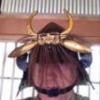-
Posts
14,357 -
Joined
-
Last visited
-
Days Won
278
Content Type
Profiles
Forums
Events
Store
Downloads
Gallery
Everything posted by Bugyotsuji
-
So why are you asking again, David? PS Notice that Nobu is a different character from the literature quoted by Francois quote above.
-
The last character is 舎 but what is that first one? 矩? Kane? 知? Tomo? 延? Nobu?
-
As Ray intimated above, I don't see that reading 談議所 Dangisho, unfortunately. Something like 信載町... possibly a place name (?), but almost unreadable for me.
-
The holes (from what we can see) do not follow normal Netsuke holes which are larger, more like tunnels. Yours look to have been drilled later on. The question is 'why?' I would still stick with a definition of 'Okimono', rather than 'Netsuke'. Admittedly they can be close in conception, especially in the Meiji period where Netsuke and Okimono can sometimes overlap. A Netsuke might have a flat bottom for example, taking on an increasing ability to stand alone as an ornament.
-
Yes, it is roughly inscribed Martin, but it does look like 兼元 Kanemoto. Short, two-character Mei. And the Hamon looks like Sanbonsugi, a Seki blade. (Which Kanemoto I cannot say.)
-
No experience of your man, but generally silence in Japan means there is no update, nothing positive to report. When it is ready they will contact you, actions speaking louder than words, and excuses being nothing more than wasted words. In my experience a message will come from out of the blue… (Just generalizations, but from what others have said above, his organization is simply slow, not criminal.)
-
Ono no Komachi, agreeing with Pietro. (Scrub Shojo!) A vertical hole is typical for an ojime slide, but not at that size, and not for a Netsuke, Graham. Are there no other holes in it? If not, then we are looking at a small *Okimono, probably not a Netsuke. The vertical hole could have been inserted later, but that would not change things apart from the ability to be strung. *Okimono literally means an object for ‘placing’, a decorative object for a flat surface, carved in the Meiji period at the earliest.
-
So definitely not Renaissance wax then, Pietro?
-
Although the yoshi 𠮷character on both nakago is not written the same way 吉 as on the paperwork (short vs long upper stroke), the signatures on those two look otherwise struck in quite different styles to me.
-
Ah, similar feeling, but now that dragon is katchushi, not tosho.
-
Dragon vs butter, but yours may be closer. Those same three dots…
-
The members of each specialty Shinsa team change over the years.
-

Handy calculator for shaku, sun, bu.
Bugyotsuji replied to a topic in General Nihonto Related Discussion
Very useful Dee. Thank you. I think I have run across that site many moons ago, but nice to rediscover it. I have a useful old tape measure showing inches, centimeters and shaku measurements on it. As a rule of thumb, one shaku is ten sun, and at roughly the same mark is one foot, i.e. twelve inches, which also coincides with 30 centimeters. A convenient convergence of three measuring systems within about half a centimeter. -
You are right of course, Pietro. Many thanks for catching that. Referring back to Sekisen, here is the entry in Lazarnick. PS ‘Onka’ should be Onko ware.
-
This may be a Shōjō… https://en.m.wikipedia.org/wiki/Shōjō The redness, the kimono sleeve, her hair…
-
The paperwork describes the surface of yours as Tsuchimé-ji, so would that not indicate that it is the original treatment? This one may be later (?) but offered just for comparison. And the reverse
-
No idea of age. The zōgan looks fairly crudely done but it’s a nice object regardless! PS There is a whole thread on Mekugi-nuki around here somewhere…
- 1 reply
-
- 1
-

-
“Extensive lacquered wear on Koshiraé.” This is deliberate, a red lacquer surface, allowing black lacquer to show through, creating the famous Negoro-ji nuri effect.
-
That is clever! Many thanks for posting this. I have not seen this combination before, though you do find them disguised in other ways, inside Tantō Koshiraé, or as Jutte, etc. Ignition is by crushing of small pellets, ‘pills’ of mercury fulminate.
- 1 reply
-
- 2
-

-
-
Yes, the Kikusui is a famous Mon/Kamon. It alludes to one of the most famous classical legends and is associated with Lord Kusunoki, inter alia. 33 says Kikusui, i.e. chrysanthemum and waters 34 says Kikusui with leaves, i.e. chrysanthemum and waters, with leaves.
-
From what I remember a group of NBTKHK (Japan Armor Society) members created this before having it printed out. The names outlined in red indicated they were older than 1600, and the black ones (like yours) post 1600. For the print copy of this hand-written version I put wavy red lines around the ‘old’ names. (I’ll see the official version in due course, but I don’t have it here.)
-
First shot is upside down and fuzzy, but the second is a little better. Can you focus clearly on the signature once more? It seems to be carved into a resin material…(?) Sometimes if signatures are not immediately obvious, we have to work with dictionaries to narrow down the possibilities. (Many are spurious, many are poorly written and barely legible, and many of course are not listed at all.) So, an art name, beginning with 籍 (Seki) or 簑(or an older kanji version of Mino or Sai?) the last character of which looks as if it might be 雲 (un). Please do not expect an answer right away!
-
Looks good from here. Do you have some overall shots?





